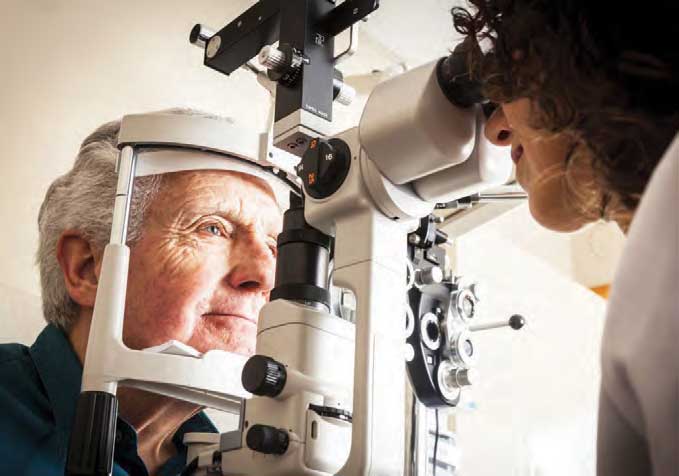
Eye examinations are an important part of health maintenance for everyone. Adults should have their eyes tested to keep their prescriptions current and to check for early signs of eye disease. Doctors check your eyes for signs of eye diseases, assess how your eyes work together, and evaluate your eyes as an indicator of overall health.
There are some symptoms that are considered “normal” when aging. Those would include dry eyes, cataracts, loss of peripheral vision, as well as spots and floaters. 75% of those over 65 experience dry eyes due to the lessened production of tears. Cataracts are also frequent among older adults. Cataracts can cause blurry, hazy vision that worsens over time. Also, oversensitivity to light are signs that an opaque spot on the lens of the eye may be growing and obscuring vision.
 Serious eye conditions that are seen with aging are glaucoma, macular degeneration, and diabetic retinopathy. Glaucoma refers to diseases that cause optic nerve damage, some of which are related to an increase in intraocular pressure, which cause progressive vision loss. Symptoms are very few until diminished vision is noticed. Conventional treatments can be pretty drastic but research is showing that vigorous exercise may reduce the intraocular pressure associated with glaucoma. Macular degeneration is the leading cause of blindness among Americans over the age of 65. Dry macular degeneration causes gradual central vision loss and results from aging and thinning of tissues in the macula or deposit of pigment. Wet macular degeneration arises from the body’s attempt to make up for lack of nutrients by building extra blood vessels beneath the retina, but the new blood vessels leak fluid which causes permanent damage to the retinal cells. Studies are showing that AMD is a nutritional and lifestyle responsive eye disease. Diabetic retinopathy is vision-threatening damage to the retina caused by diabetes. Blindness is largely preventable if the patient and doctor work together for proper use of medications, blood sugar testing, and proper diet and lifestyle.
Serious eye conditions that are seen with aging are glaucoma, macular degeneration, and diabetic retinopathy. Glaucoma refers to diseases that cause optic nerve damage, some of which are related to an increase in intraocular pressure, which cause progressive vision loss. Symptoms are very few until diminished vision is noticed. Conventional treatments can be pretty drastic but research is showing that vigorous exercise may reduce the intraocular pressure associated with glaucoma. Macular degeneration is the leading cause of blindness among Americans over the age of 65. Dry macular degeneration causes gradual central vision loss and results from aging and thinning of tissues in the macula or deposit of pigment. Wet macular degeneration arises from the body’s attempt to make up for lack of nutrients by building extra blood vessels beneath the retina, but the new blood vessels leak fluid which causes permanent damage to the retinal cells. Studies are showing that AMD is a nutritional and lifestyle responsive eye disease. Diabetic retinopathy is vision-threatening damage to the retina caused by diabetes. Blindness is largely preventable if the patient and doctor work together for proper use of medications, blood sugar testing, and proper diet and lifestyle.
Here are some of the easy steps to keep your eyes healthy. Having a healthy lifestyle, you want to have a healthy diet and exercise regularly. There are certain nutrients and vitamins that help ward off age-related vision problems. Your eyes need good blood circulation and oxygen intake, and both are stimulated by regular exercise. You want to be sure to wear sunglasses to help protect your eyes from the sun’s UV rays. Too much UV exposure can boost your chances of cataracts and macular degeneration. Keep these simple steps in mind to help protect your sight and see your best.
Please join us January 16th at 1:30 pm in the PAC for our Smart Moves presentation on Eye Health.





 © 2025 Kirby Pines LifeCare Community. All Rights Reserved |
© 2025 Kirby Pines LifeCare Community. All Rights Reserved | 